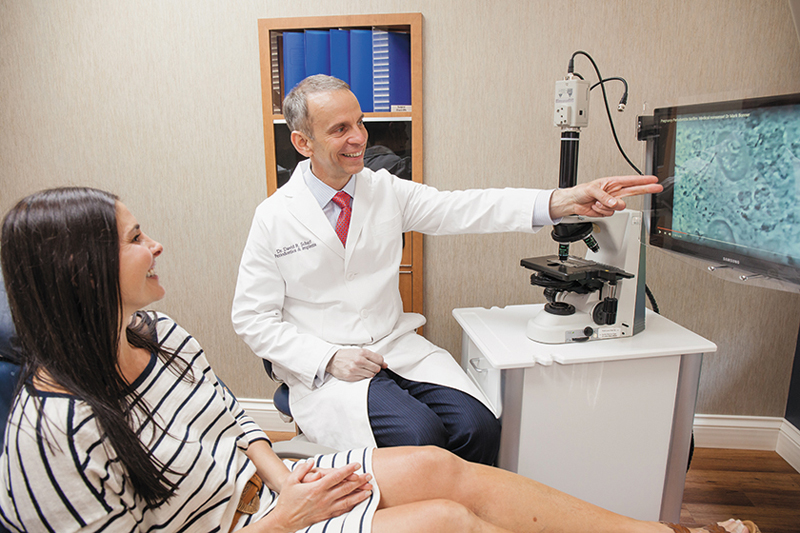
Periodontal Maintenance in Long Island
Click above to see reviews.

As a periodontist, Dr. David Scharf provides numerous treatments that benefit the gum tissues that support your teeth. If you suffer from severe issues with your oral health, we may recommend periodontal treatment and maintenance.
What Is Regular Periodontal Maintenance?

Regular periodontal care and maintenance will provide cleaning and treatments that go deeper than the typical processes offered by a dental hygienist or a general dentist. This care is available to patients who are experiencing periodontitis, commonly known as gum disease.
Mild and moderate forms of gum disease are treated with procedures called scaling and root planing. These processes are also widely known as deep cleaning. Through scaling, we can remove the plaque and tartar that may have built up around your teeth and gum line. Handheld instruments are used to complete this process as well as ultrasonic instruments. After your teeth have been through the process of scaling, we will then provide root planning. This process is to smooth out the now-visible roots of your teeth. The two-step process provides the environment necessary for gums to reattach to the back of your teeth.
Once this process is complete, we typically recommend patients proceed to periodontal maintenance.
Why Do Patients With Periodontal Disease Need Maintenance?
Patients who suffer from gum disease will usually have developed periodontal “pockets” during the disease’s progression. These pockets are deep gaps and spaces between the gums and teeth, formed when the diseased tissue recedes from the tooth surface. These areas present numerous issues, including the buildup of tartar and plaque.

Periodontal maintenance follows these cleanings and treatments. The intense process is essential to restore the health of both the bones and gums. When bacteria are present, the gums can become inflamed or infected, which can lead to the development of other health issues.
One study in 1984 revealed that harmful bacteria could multiply and again create the environment for gum disease to re-develop, usually between one or two months after initial treatment. Because bacteria are ever-present in the oral cavity, it is imperative to have periodontal maintenance treatment every three months. We may vary the intervals for periodontal maintenance depending on the individual needs and requirements of the patient.
The gum infection that causes damage to both the bones and gums can be mild, moderate, or severe. A mild form of the disease is known as gingivitis. Symptoms are red gums that are swollen and easily bleed. When untreated, gingivitis progresses to periodontitis. Continued poor hygiene and without proper treatment, periodontitis leads to the deterioration of the bones and gums. Over time, it may even cause tooth loss.

Benefits Of Periodontal Maintenance
If you are suffering through periodontal disease, seeking treatment and maintenance to help your gums heal is vital. First, when tartar both below and above the gum line is allowed to progress into gum disease, severe gum issues develop, up to and including tooth loss. Keeping your natural teeth will benefit you throughout your lifetime. Having a healthy mouth will affect your overall health as well.
It is essential to realize that even with the best brushing and flossing habits, it can be impossible to remove debris from the gum pockets through home care. Necessary treatment is only available when a periodontist treats the problem with specialized equipment and professional experience.
This process will also provide you with aesthetic benefits. Dr. Scharf is aware that it is difficult to maintain a high level of confidence when there are significant problems with your smile. This includes issues with teeth that may be yellow or stained. With the maintenance he provides, you can regain a beautiful and healthy smile.
It is common for gum disease to lead to halitosis or severe and persistent bad breath. Rotting food particles, festering bacterial infections, and untreated cavities cause this problem. When plaque, calculus, and bacteria are gone, the issue is significantly improved.
What Occurs During Periodontal Maintenance
When you come in for a periodontal maintenance visit, we will examine your pocket depths and your overall gum health. We clean slightly below the gumline. It is here where you are more susceptible to the buildup of tartar and plaque, especially if you have a history of gum disease.
There are typically several stages of periodontal maintenance:

- Supragingival cleaning – Areas above the gum line will be cleaned thoroughly to diminish levels of plaque and calculus.
- Subgingival cleaning – This is the most crucial step for patients with gum disease. We complete this process by removing calculus and bacteria from the gum pockets as well as the gum line.
- Root planing – Remaining dangerous bacteria is eliminated through this process. The removal of this bacteria is one of our top priorities.
- Medication – Antimicrobial or antibiotic cream may be applied in the gum pockets. Medication helps healthy, fast healing in the pockets and ensures that levels of discomfort are significantly reduced.
- X-ray and Examination – We recommend routine X-rays to ensure that we can track the extent of gum and bone recession. It can also help us identify any areas that may require further attention.
We ensure that every patient who receives this treatment remains in complete comfort throughout the procedure. As your periodontist, Dr. Scharf will discuss the appropriate anesthetic options as well as how frequently you will require this procedure. We will also be able to discuss your insurance plan to pinpoint what procedures are covered. Contact us if you have any questions or would like to schedule an appointment today!
Long Island Periodontal Maintenance
ADDRESS:
98 East Main Street
Babylon, NY 11702
Get Directions
PHONE: (631) 661-6633
OFFICE HOURS:
- Monday: 11:00 AM to 8:00 PM
- Tuesday: 9:00 AM to 8:00 PM
- Wednesday: 8:00 AM to 5:00 PM
- Thursday: 8:00 AM to 5:00 PM
- Friday: 8:00 AM to 5:00 PM
